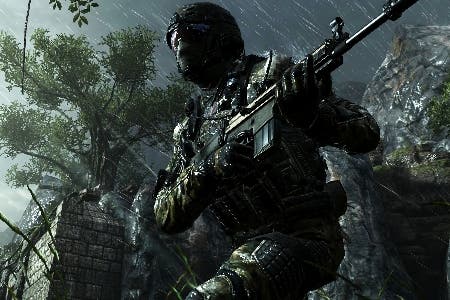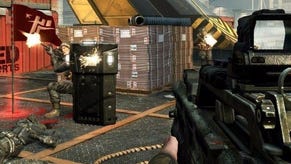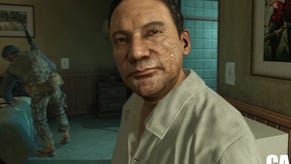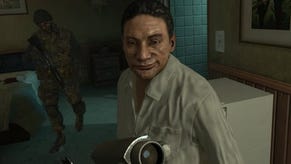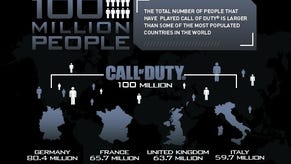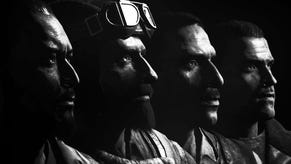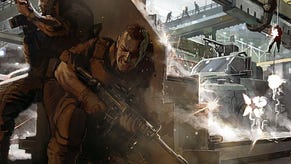Face-Off: Call of Duty: Black Ops 2
Surprise?
| - | Xbox 360 | PlayStation 3 |
|---|---|---|
| Disc Size | 7.6GB | 15.6GB |
| Install | 7.6GB (optional) | 1.8GB (optional) |
| Surround Support | Dolby Digital | Dolby Digital, 5.1LPCM, 7.1LPCM |
Treyarch's Black Ops 2 is a bit of an enigma in the canon of Call of Duty titles. The branching pathways of the largely character-driven story, its new RTS-style "Strike Force” missions, and the move away from a killstreak-focused multiplayer each stand as bold changes in themselves. However, there have also been some curious changes to the series' underlying engine that directly impact how each console version looks and plays.
The basic Infinity Ward groundwork from previous games remains intact here, and it's once again iterated upon for this release. Those waiting for a more radical overhaul - a la DICE's Battlefield 3 - will have to wait on, but we are promised advances with the addition of bounce lighting, improved water effects, high-dynamic range, and even DirectX 11 features for PC. Certainly, the principal scripting of Black Ops 2's gunplay will be comfortably familiar to fans, but the hope is that these improvements will also offer up an extra layer of gloss.
Our early analysis of the 360 and PS3 versions showed some striking differences - mainly relating to a hit to image quality on Sony's console. For a closer inspection, we've put together a head-to-head video using matching gameplay captures. [Update: We've now updated the comparison videos to account for the visual changes made in the 1.03 PlayStation 3 patch.]
"Xbox 360's upscaling from a low native resolution of 880x720 is expertly handled and looks good, but PS3 blur is definitely an issue."
Alternative comparisons:
- Call of Duty: Black Ops 2 - Xbox 360 vs. PC
- Call of Duty: Black Ops 2 - PS3 vs. PC
So let's start with image quality. The 360 puts on a very impressive show despite Black Ops 2 running at just 880x720 native resolution. The 2x MSAA in combination with an impressive upscaling filter does wonders with the process of clearing sharp edges on the cut-down horizontal axis, and the very worst aliasing we see is on 2D elements, such as blocky-looking foliage that can crop up in the earlier levels. By comparison to the PC version running at a native 1280x720 with 4x MSAA, we see only a very slight softness to the image on Microsoft's box - the decision to go with this setup is undoubtedly an improvement over Modern Warfare 3, which scaled both axes to a murkier effect.
There's clearly something amiss on the PS3 side though, and the cause is twofold: resolution and Treyarch's choice of anti-aliasing method. We find the game hitting the same 880x720 figures enjoyed on 360 in places, but this isn't a constant throughout the game. Rather, it appears to be more dynamic than first thought, where several tests of the first level's river scene gives us a reading as low as 832x624. Scaling these resolutions typically produces more pixel crawl on PS3 as a result, and looks a world away from the sharpness what we're seeing on 360, which remains locked at its own resolution.
A resolution drop of this nature isn't enough to account for the excess blurriness on its own, however. What we think is a heavy post-processing technique is used to clear up the sharp edges, and some of its characteristics appear a match for the long-neglected quincunx AA available natively on Sony's hardware. As a result, Black Ops 2's edge-smoothing on PS3 is generally more thorough than rival platforms, even with the PC running at 4x MSAA in our captures. The downside to this approach is the heavy residual blurring to texture-work, plus the muddying of foliage elements in the background.
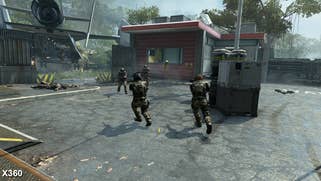
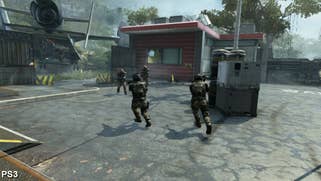
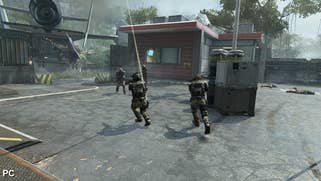

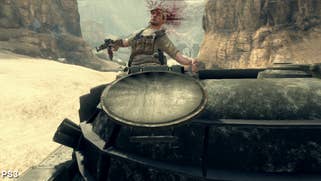
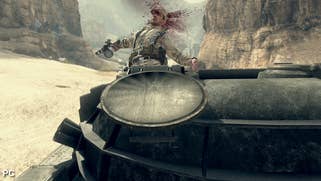
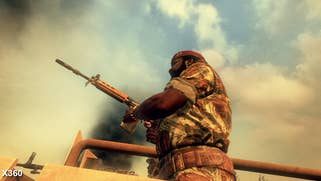
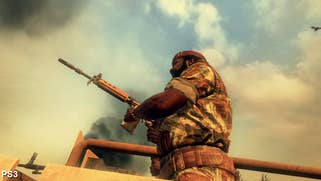
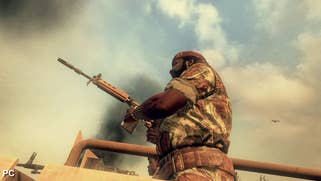
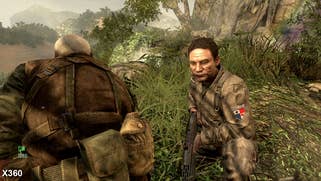


Following our earlier blog entry, we've been informed that the blurring seen on PS3 can be alleviated by deleting the latest 56MB patch, listed as update 1.02. Sure enough, we find taking direct 24-bit RGB captures of the game patched and unpatched reveals a considerable divide in image quality. Textures appear more defined in like-for-like shots, and the rampant blurriness to bushes and grass tufts is lessened.
It's a step forward, but even with this fix, overall clarity is still clearly below that of the 360 version. This earlier iteration of the game also appears to run with the same range of internal frame-buffers, and we once again record 832x624 during the opening Pyrrhic Victory campaign stage.
A problem also arises for players focused on the online multiplayer modes, which demand that you run on the latest blur-inducing patch. It's not an ideal situation, as the blur can be a real impairment to visibility when scanning into the distance on long maps without a scope to hand.
Update: It's all change again, with another PS3 patch rolled out on November 17 restoring the look of the game to the unpatched original. Image quality still favours the Microsoft platform however: moving to the 360 version after a PS3 session is still like wiping away the grease from a lens.


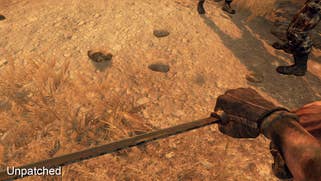

Up close and personal, we see very few changes between the PS3 and 360 versions in multiplayer or Zombies modes, which tend to be less elaborate in visual design than the campaign in order to boost performance. There are no wild horseback chases across desert plains, for example, nor a hint of the vehicular control we see in the levels set in 2025. Unlike Battlefield 3, much of the environment also remains entirely static; fruit boxes are rooted to the spot when fired at, and colliding with chairs has no impact. Walls still can't be chipped to reduce an enemy's cover, either, though such physics-based features are the preserve of games running at 30FPS rather than Black Ops 2's 60FPS, where processing time is at a premium.
Differences are difficult to pinpoint in these modes too. Texture and shadow filtering seems to be of the trilinear variety on both platforms, most easily noticeable when walking prone around the colourful, tiled flooring of the Overflow stage. Elsewhere, texturing looks remarkably close when disregarding the PS3's blur, and depth-of-field halos appear around the periphery of the gun to equal effect when aimed down the sights. All told, assets and effects are of an even keel in the mode that will be played most, while campaign shows the bigger discrepancies.
On the PC side of things, the range of graphical settings has been reduced from Modern Warfare 3's selection a touch. Here we have texture, depth-of-field and shadow quality settings, a toggle for ambient occlusion, plus adjustments for the number of concurrent corpses. It's also possible to tweak the field of view from the consoles' default 65 to something less restrictive if you'd prefer.
"PC offers a vast raft of visual upgrades over the console versions and includes an FPS debut for NVIDIA's cutting-edge TXAA anti-aliasing technology."
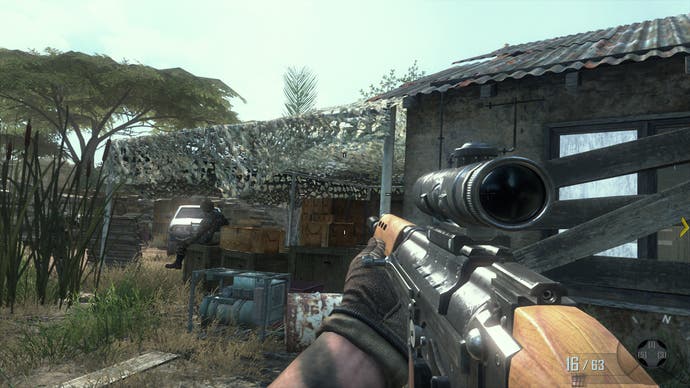
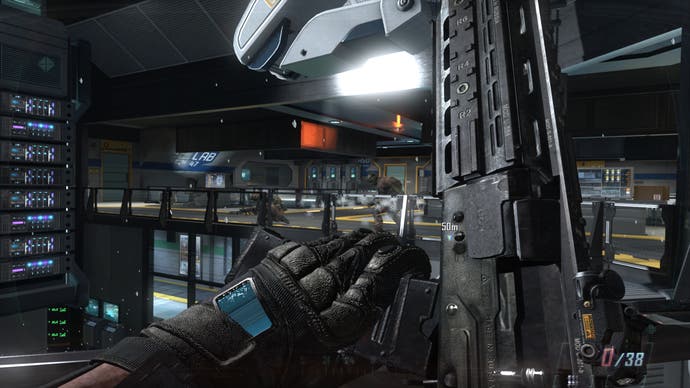
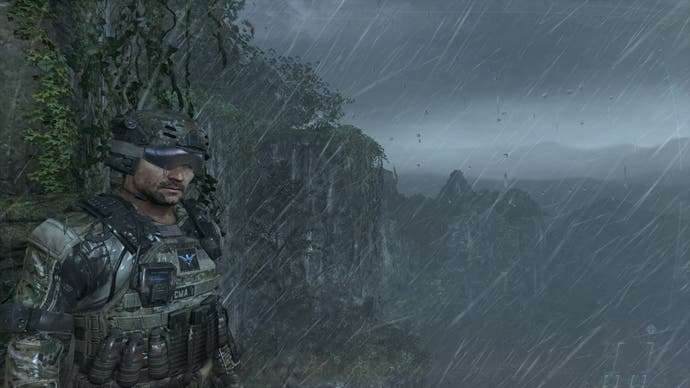
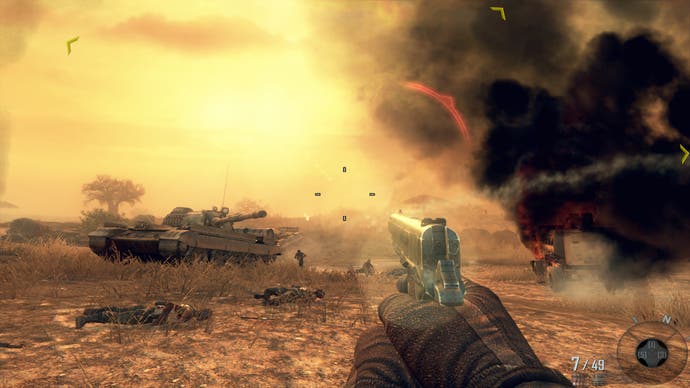
The range of anti-aliasing options here is respectable too. For those boasting NVIDIA's Kepler-based GPUs, it's possible to set aside the game's MSAA and FXAA options in favour of TXAA - a professional-grade algorithm which combines hardware anti-aliasing with a temporal filter. This uses samples from inside and outside any given pixel, and resolves it through reference to previous frames, creating a filter that removes pixel-crawl artefacts entirely. It's often best seen in motion as a result, as it does add a smidgen of blur across the image to achieve these results.
Above we have the game running maxed out completely. Much of the previous game looked barren at this higher resolution, but here we find plenty of details to justify the boost to 1080p. Alas, screen-space ambient occlusion doesn't have quite the effect we had grown to expect. Patches of shadow usually build up underneath moveable objects, such as corpses, but here we see little more than a self-shadow stretching across the ground.
Call of Duty: Black Ops 2 - performance analysis
Reaching the series' signature 60FPS target is the other major challenge for the Call of Duty series on console, where the increasing ambition of the single-player outings has historically cut into performance. Black Ops 2 is no exception to the rule; we have dog-fighting in jets across a besieged Los Angeles skyline, plus skirmishes across desert plains on horseback, each of which show a widening to the scale of the battlefield we haven't been entitled to before.
"In like-for-like scenes it's clearly the Xbox 360 version that has the drop over the PS3 game in terms of overall smoothness and fluidity."
The new water effects and abundance of alpha take their toll on the available RAM in the 360 and PS3, as we can see in videos cut from like-for-like footage. Riding through African plains filled with charging enemies and exploding tanks tugs the frame-rate down harder on Sony's platform, where we see it drop to the 40FPS mark at lowest. By contrast, the 360 holds up more convincingly at 50FPS by the same point. Both versions seem to operate with v-sync engaged - a Call of Duty staple - though sometimes the framebuffer is flipped after the screen starts to refresh, resulting in a tear at the very top of the screen. [Update: Text and videos updated with tear-line analysis.]
The worst performance recorded in our test comes about during an early sequence in Fallen Angel stage, where battles take place on flooded streets with mechs and an abundance of smoke effects. This chaos puts the PS3 at half of Treyarch's target frame-rate, at 30FPS, while the 360's performance crumbles down to almost the same level.
Unsynchronised footage of each version extracted from gameplay captures paints a slightly more flattering picture. We still see significant drops to 50FPS that can make movement feel sluggish during hectic shootouts, and once again it's the PS3 version that takes the greater flak once the alpha effects cluster up in small spaces. However, the Cordis Die level shown at Microsoft's E3 press conference last year has been much improved on and where we now see figures much closer to the top end of the FPS spectrum.
"The gap between the two console versions closes a touch during gameplay and PS3 performance appears to show a marked improvement over the last Black Ops title."
But of course, the campaign mode only accounts for a fraction of the Call of Duty experience for most players - and is often neglected outright in favour of multiplayer. Competitive play demands sharp controller response, and so upholding a target 60FPS is tantamount to deciding the outcome of a one-on-one encounter. Here, we test a selection of medium-sized multiplayer maps, such as Aftermath, Drone and Meltdown, to get an idea of how each format copes in these scenarios.
Before jumping in, we make sure to have the PS3's 1.8GB optional install in effect, which also covers the Zombies mode (though no such option is available for campaign). According to David Vonderhaar of Treyarch, no major performance boost is promised as a result of the install, and this is purely to save wear and tear on the PS3's Blu-ray drive for the most frequently played modes. In effect, the most regularly streamed assets - the textures - are offloaded to the HDD to spare constant seeking of the disc's table of contents.
Results in multiplayer are excellent. We have the smoothest response we could ask for during play, with only occasional dips to 55FPS whenever smoke grenades or spark effects fill the screen. This falls in line with performance habits for previous entries in the series, where processing these buffers proved to be the weakest point in the rendering chain. Fortunately this doesn't crop up often enough to detract from playability - though we do suffer from regular netcode problems on both platforms with our 60MB fibre connection, giving us in hiccuping stretches of play until host migration kicks in. Reports of freezing on PS3 are also a concern, though many of these issues will hopefully attended to once the launch-week rush has passed.
"Frame-rate is all-important in the multiplayer game and here we see that both Xbox 360 and PS3 adhere very closely indeed to the target 60 frames per second."
Stereoscopic 3D is also supported on both console platforms and we found that both Xbox 360 and PlayStation 3 games operate between 25 to 60 frames per second depending on load, and there is also a resolution penalty. Both games use the HDMI 1.4 standard, where both views are stacked vertically into a 1280x1470 framebuffer, which is then translated into a 720p120 output by the 3DTV. The Xbox 360 version still seems smoother, but the inconsistencies in the update on both versions are somewhat off-putting. There also seems to be a curious bug on 360 where the stereo viewpoints have a vertical offset (stereo images should only be separated horizontally) - a bug that is actually physically painful to put up with, making the 3D support unbearable. Until this is resolved, 3D gamers are better off with the PS3 version.
Call of Duty: Black Ops 2 - the Digital Foundry verdict
It's to Treyarch's credit that it's pushed the boat out as far as it has with Black Ops 2. The game benefits greatly from a less rigidly structured campaign, feeding off a handful of larger, free-roaming environments while vehicle-bound, along with the inclusion of diverging paths during certain levels. That said, dog-fighting in jets isn't exactly in keeping with the 60FPS blueprint originally laid out by Infinity Ward, and so many of these exciting steps forward are cut from the equation for the popular multiplayer mode.
"The 360 version gets the nod overall but in the crucial multiplayer mode, it's only really the image quality issues that separate the two console versions - frame-rate is largely equalised."
But down to the crucial question: Xbox 360 or PS3? For the campaign playthrough there's a clear winner in Microsoft's platform, by virtue of its higher-resolution textures, superior shadow filtering, and its crisply scaled native resolution - sub-HD as it is - that looks closest of the two to the PC version's full 720p output. Sadly, the PS3 version's image quality suffers more than it should owing to its anti-aliasing technique, which blurs over an image operating with what appears to be a dynamic framebuffer. It's an unsightly combination that doesn't really pass muster, though the 1.03 patch appears to improve matters a touch.
On the multiplayer side, the good news is that frame-rate issues are by and large resolved. Unlike the buckling update we see during single-player where it's often PS3 trailing behind, it's clear sailing at 60FPS for competitive online play regardless of which version you pick. However, the biggest bugbear as of writing is finding a decent connection while matchmaking online, which can be a touch-and-go process during the launch of any high-profile title.
All in all, the rifts in image quality and performance are pronounced enough to make 360 an easy recommendation today - moreso than last year's Modern Warfare 3. Elsewhere, the PC version shows great visual flair thanks to its extra quality setting for textures, improved shadows, and its range of AA options. However, even with these extra bells and whistles, it doesn't rise to the technical heights of DICE and Crytek's latest powerhouse shooters. As such Black Ops 2 stands as a worthy incremental step forward for the series, leaving us to wait longer for the grand overhaul that must surely be on the horizon.
